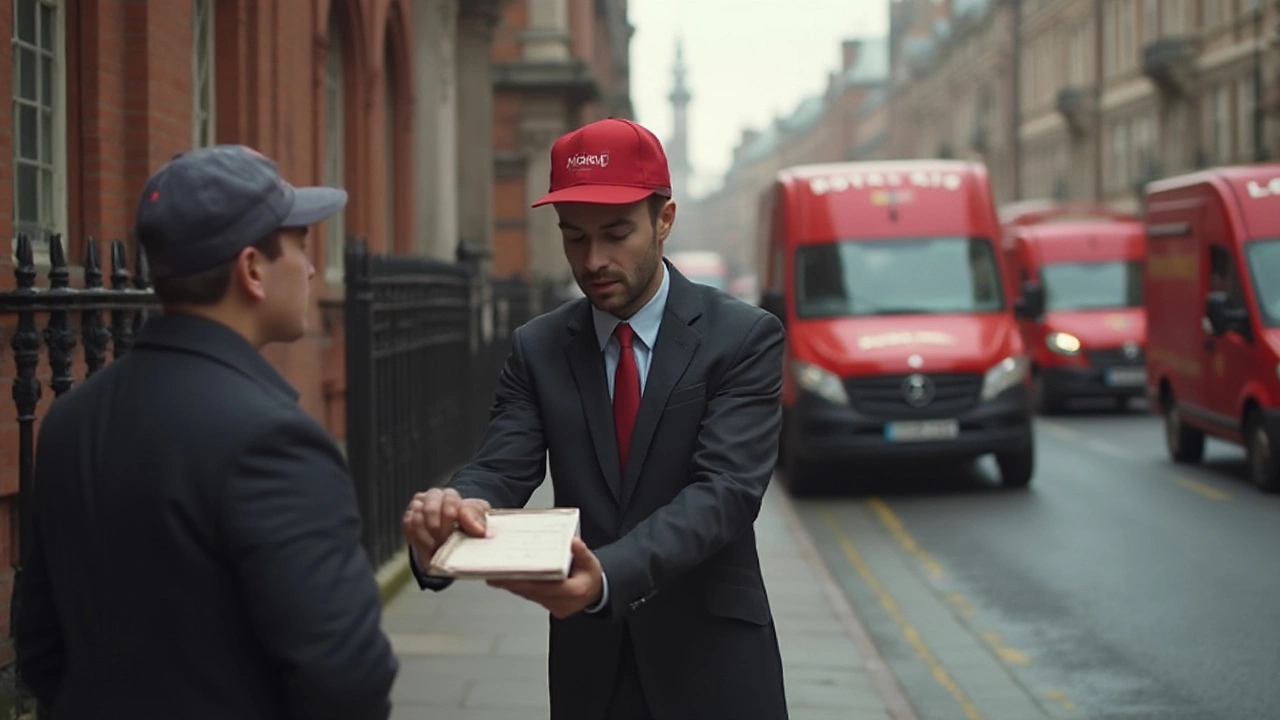When to Use a Courier Service: Timely Shipping Tips and Insider Advice

Ever stood in line at the post office, clutching a package that should've reached its destination yesterday and thought, “There’s got to be a faster way”? When the stakes are high—think court documents, test results, or grandma’s birthday present—a courier isn’t just an option, it’s a game changer. Maybe you’ve used one before, or maybe you haven’t taken the plunge because you’re not sure when a courier makes sense, or what makes them different from every other delivery service out there.
This is about understanding the when and why. There’s a big difference between shipping a box of homemade cookies and sending a stack of signed contracts for a million-dollar deal. A courier is more than just a person in a van; it’s about speed, tracking, and reliability—sometimes all that stands between you and a missed deadline or a disappointed client. The courier business, while it’s centuries old, has gotten a modern facelift. In 2024, data from Statista showed that the courier and express delivery industry surpassed $480 billion globally—a huge leap from just a decade ago. This shift isn’t because people suddenly love paying extra; it’s because the world demands faster, safer, and more personalized delivery than ever before. Still, is every urgent package a candidate for a courier? Not always. Knowing when to book one can save you money, frustration, and maybe even your reputation.
Understanding What Couriers Do (and Don’t Do)
Let’s clear the air—because not every “express” delivery counts as a true courier service. Couriers are not your regular mail carriers. They specialize in time-definite, point-to-point delivery that usually covers same-day and next-day arrivals. Imagine the difference between tossing a birthday card in a mailbox and handing it over, in-person, to someone who promises, with their name on the line, that it will reach New York by the morning. That’s the weight couriers carry.
Modern couriers use tracking tech that provides real-time status updates. A reputable 2025 study out of MIT’s Center for Transportation & Logistics found that 79% of businesses preferred couriers over standard postal services for urgent items, specifically citing live package tracking as the top reason. Couriers also handle things personal post can’t—think rare artwork, medical specimens, custom electronics, or even confidential legal documents, sometimes with built-in insurance or temperature controls.
Here’s where a lot of folks get tripped up: ‘Express’ at a big box shipper isn’t always the same as a real courier service. Express can still mean hours in a warehouse, mixed with dozens of others bound for the same city. True couriers, especially local ones, run direct routes with less handling and almost no transfers. This massively reduces the chance of breakage, delay, or misrouting. If you’ve ever shipped a cell phone through regular mail and watched it bounce from one sorting center to another, that’s what a courier helps you avoid.
Now, they don’t do everything. Couriers don’t generally haul pallets of furniture or handle large-scale freight. Instead, think packages you can carry, high-value items, or those with high urgency. If you need 100 chairs moved from Lisbon to Madrid—call a freight company. If you absolutely need your signed passport to the embassy in forty-eight hours, that’s squarely in courier territory. In fact, a San Francisco start-up recently made headlines by directly connecting freelance couriers to doctors needing same-day medical test results, cutting hours of waiting compared to traditional medical logistics.
It’s not just businesses that use couriers. Maybe you forgot your laptop at a friend’s place and need it for tomorrow’s meeting. Maybe your pet needs urgent medication that only one pharmacy stocks across town. Some couriers have even delivered engagement rings after a last-minute proposal glitch. Sure, it’ll cost more than regular post, but for anything irreplaceable—or when time actually is money—it can be the only choice that makes sense.

The Real Moments You Should Call a Courier (And When You Shouldn’t)
Couriers really shine when you need certainty and speed. Picture this: you’re closing on your first home and need paperwork at the bank by 4pm or you lose the deal. Or you’re shipping keys, high-value electronics, one-of-a-kind prototypes, or anything where loss would be catastrophic. Let’s break down some concrete scenarios where a courier is the smart play:
- Time-sensitive Documents: Court filings, passports, government forms with tight deadlines. Missing a cutoff can cost you dearly.
- Medical Shipments: Human tissue samples, urgent medicine, or lab results that must stay cold and arrive fast.
- High-value Items: Jewelry, artwork, electronics—things you want hand-delivered with insurance and a clear chain of custody.
- Personal Emergencies: Lost documents, forgotten items, or last-minute gifts where overnight just isn’t fast enough.
- Business-critical Deliveries: Contracts or proposals where being late could sink a deal or a relationship.
On the other side, it’s easy to fall into the trap of “faster is always better.” But sometimes, a courier just isn’t necessary—or worth the cost. For standard online shopping returns, bulk shipments, or anything replaceable and non-urgent, stick with regular parcel services. You’ll pay less, and the time difference usually won’t matter much. Courier rates can get steep quickly, especially for longer distances or after-hours service. If the item isn’t urgent or unique, the cost might not be worth it.
Here’s an insider trick: always ask for a quote upfront and be clear about your pickup and delivery windows. The best couriers will offer options you maybe didn’t know existed—like rush, standard, or after-hours—and they’ll tailor pricing to fit. Smaller couriers can flex more than the big names. Some even let you track your driver in real time, similar to food delivery apps, so you know exactly when and where your package is.
Thinking about price versus risk is huge. Recently, a big city florist switched to one-hour couriers for wedding bouquets—a gamble, since flowers wilt fast. They found that while they paid more, complaints about ruined arrangements dropped by 93%, and their return customers soared. Little details like that can make all the difference when your business or special moment is on the line.
If you’re not sure, ask the courier: “Is this something you’re equipped to handle?” Most reputable companies have nothing to hide. If they hem and haw, keep shopping. Real couriers love showing off their specialties, whether that’s handling antique guitars or signed original sketches from a comic-book artist.

Tips for Getting the Most Out of Your Courier Experience
So you need a courier—how do you make sure your Urgent Package Drama doesn’t turn into a Real World Nightmare? There’s a rhythm to getting it right, and it comes down to communication, preparation, and knowing a few levers you can pull for extra peace of mind. Let’s get into some hands-on advice.
First, always label your item clearly and double-check both the address and the receiver’s phone number. Mistyped info is the #1 avoidable reason for delays. Also, make sure someone is actually there to receive the package (or leave safe instructions if not). If you’re shipping valuables, use a bit of extra padding and consider tamper-evident bags, which couriers often provide for free.
One of the best tools? Insurance. Yes, it adds a few bucks, but it covers you for loss or breakage, and makes any claims process way smoother. According to the National Association of Professional Couriers, 2024 saw record claim settlements—faster and more customer-friendly than ever thanks to better tech integration between couriers and insurers. If what you’re shipping is worth more than a week’s wages, insuring it is a no-brainer.
Transparency matters: ask your courier for tracking details and expected delivery times before you hand over your stuff. Take photos of what you’re shipping, especially if it’s fragile or rare. Some customers also request a delivery photo as proof of arrival (couriers can usually snap one on their phone, much like Amazon deliveries). This extra step saved a Brooklyn band thousands when their custom equipment was delivered late at night, with a photo confirming “porch drop-off” and clearing up a billing dispute instantly.
If your package has special needs—like temperature control or signatures—mention this beforehand. Couriers can adapt, but only if they know what’s coming. And while big names may automate a lot of the process, independent couriers can actually go the extra mile with odd-shaped packages or off-hours jobs. A recent quote in Logistics News put it simply:
“The single greatest factor in on-time delivery is proactive communication from both sender and courier. Honestly, just keep talking.”
One tip most folks overlook: many cities now have bike and electric vehicle courier options, perfect for urban deliveries and often faster in rush hour. They’re eco-friendly and can zip across town when larger vans get stuck. Ask your courier what fleet options they have—you might save time and reduce your carbon footprint at once.
Finally, remember that couriers depend on their reputation. Look for online reviews, ask for credentials if you’re sending something major, and never be shy about verifying delivery stats. The best couriers are happy to share their record, and it’s your right to be picky when minutes and memories (or money) are on the line.
Courier service isn’t always the cheapest or flashiest, but it steps in when you need that peace of mind nobody else can offer. Your time and trust are valuable—don’t waste either on guesswork or hidden service limitations. The best couriers treat your delivery like their own, and that’s why, even in a world where everything moves at the speed of a swipe, there’s still a place for the human touch.